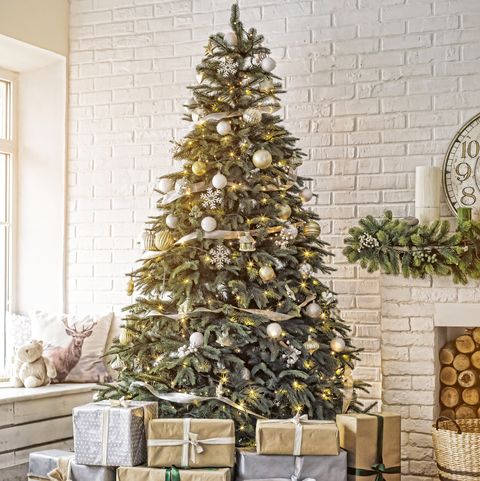Bad news, folks: While you may want your real Christmas tree to stay fresh and last well into the new year, there’s a chance that you’ll be left with a dry, brittle tree before December 25 hits. Since that’s the last thing anyone wants during the holiday season, the home care experts at the Good Housekeeping Institute rounded up the best tips for making sure that your tree looks alive and well come Christmas morning.
How long do Christmas trees last? With proper care, most real Christmas trees should last at least five weeks or more. That means, if you decorate for Christmas in late November, your tree should survive beyond the holiday festivities.
Follow these tips to keep your Christmas tree looking fresh long after it’s cut.
1. Choose a healthy Christmas tree.
First, note that if you prefer to buy your tree from a garden store or roadside lot, it likely came from out-of-state and has been exposed to drying winds in transit. If you’re looking to start with the freshest possible tree, opt for one from your local Christmas tree farm. Either way, it’s essential to know how to choose the best Christmas tree.
Keep these tips in mind as you shop for your Christmas tree:
- Look for a healthy, green tree with the least amount of brown needles.
- Select a tree displayed in a shady location. Avoid picking from a sunny area.
- Run a few branches through your hands. The needles should feel pliable and not fall off.
- Raise the tree a few inches, then drop the trunk into the ground. Very few green needles should fall off, but it’s fine if the tree loses a few brown ones.
2. Trim the trunk (and then trim it again).
When you purchase a Christmas tree, double-check that the seller makes a fresh cut straight across the base of the trunk to aid water absorption. This gets rid of any dried-over resin that might block the tree from absorbing water. When you get home, if you’re not putting your tree up right away, place it in a bucket of water. (Note that you should always store real trees in an unheated garage or area that’s protected from wind and freezing temperatures.)
When you’re ready to bring it inside, make another one-inch cut off the bottom of the trunk. Once inside, place it in a sturdy stand that holds at least one gallon of water.
3. Make sure your Christmas tree always has enough water.
Don’t forget to regularly give your Christmas tree water — too little can cause resin to form, which means the tree won’t absorb water and it will dry out quickly. Follow this rule of thumb: For every inch of the trunk’s diameter, fill the stand with one quart of water.
Even though you’ve heard people talk about adding things like bleach, corn syrup, aspirin, and sugar to the water, tree preservatives and additives are probably unnecessary. Most experts agree that plenty of clean water is all you need to keep a tree fresh. Just remember to check the water level daily — it should always cover the cut end of the trunk. Refill as needed.
If you lower the temperature in the room, it can help slow down the drying process (and therefore result in your tree requiring a bit less water), according to the National Christmas Tree Association.
4. Keep the Christmas tree away from heat sources.
Sure, there’s nothing more lovely than a beautifully decorated Christmas tree beside a roaring fireplace — but, along with sunlight radiators, air ducts, and stoves, a regularly-used fireplace could contribute to your tree drying out at a much quicker pace.
If your home is prone to dryness, try using a humidifier to add moisture to the room. The Good Housekeeping Institute recommends the Vornado EVAP40 Humidifier for large areas (like the living room!). It performed well in our tests and can add enough moisture to the air to keep your tree fresh longer.
5. Take your tree down before it dries out.
If you wait too long, you’ll have more dead pine needles to deal with. The easiest way to clean up fallen needles is by using your vacuum’s hose. Skip the fancy attachments and just use the end of the hose to draw needles directly into the bag or canister.
When you’re officially done with your tree, you have a couple options: You can start a new compost pile with it, recycle it, or turn it into mulch yourself. You can also ask your town about what disposal options it offers, if you’re looking for a more eco-friendly solution.
This content is created and maintained by a third party, and imported onto this page to help users provide their email addresses. You may be able to find more information about this and similar content at piano.io



